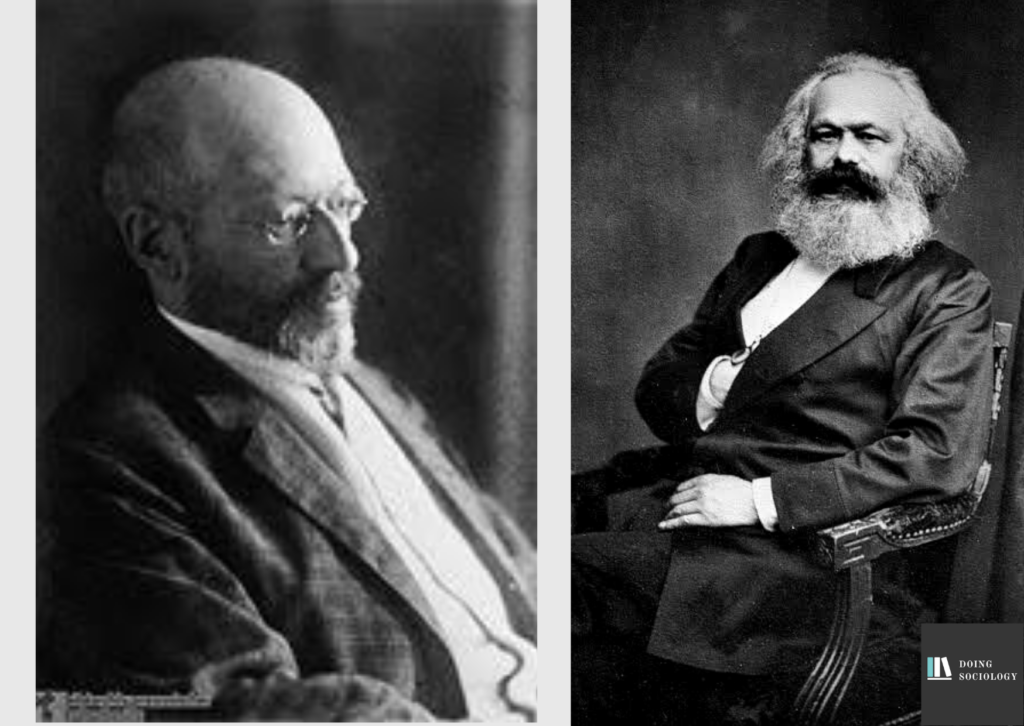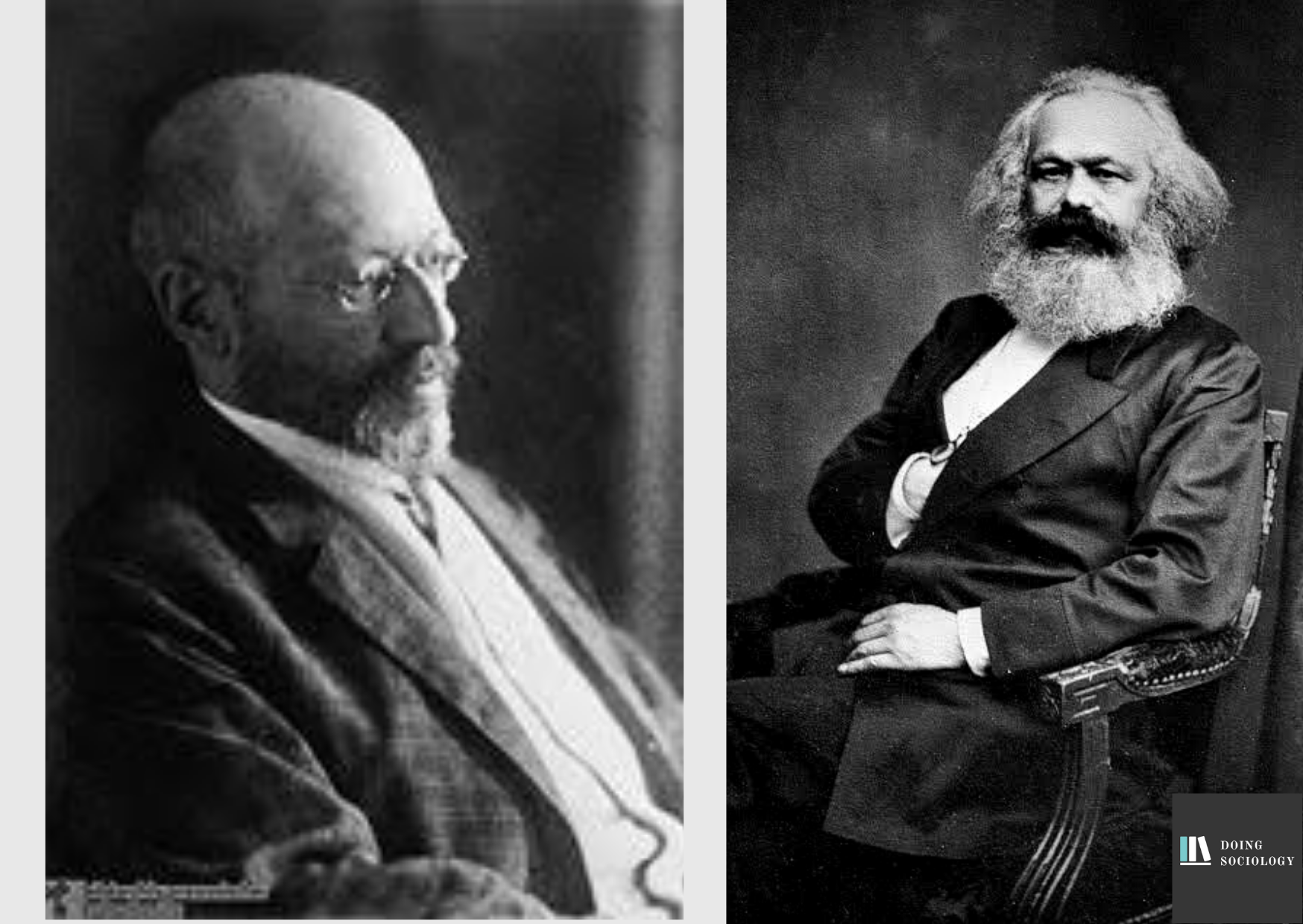
This article comes out of a need for reconciliation in my research work. I keep getting stuck at particular binaries – caring for students/researchers-caring for teachers/researchers, caring for students-caring for discipline, caring about knowledge production – caring about democratising knowledge, etc. Sometimes I arrive at conclusions that favour one aspect of each of these binaries but acquaintances with remarkable individuals1 leads me to take a moment to reconsider. So, this article is written to provide some cursory2 and possible resolutions for binaries. In other words, I intend this article to be useful for someone who, for whatever reason, is trying to avoid being burdened or overdetermined by one aspect of any binary at the cost of the other.
To do this, I use two of the ‘fathers’ of sociology – Karl Marx and Georg Simmel. Both are taught in most ‘Classical Sociological Theory’ courses at the master’s level in sociology.3 “What would Marx and Simmel do in the face of binaries?”, that is, the question that I intend to address in this article. Returning briefly to the term “cursory” here – I do not intend to present authentic Marx and Simmel to the reader. The Marx and Simmel that you will encounter in this article are better described as “serviceable” / “instrumental” rather than “authentic”. That is to say, if the reader reads beyond this article, at some point, this article is bound to become useless. Therefore, readers who are already Marxists or Simmelians would do better if they stop reading at this point.
Marx
When I think of the term “binary”, the image that is invoked for me is of a disgruntled, usually scholar of Political Economy or (dominant) Feminism grumbling about “trends” in academia taking more and more space and pushing out “real” academic work. I recognize that this is a very specific image and the only explanation for it is – I have been ruined by institutionalisation. Nevertheless, we must persist. Why “taint” Marx and Marxism with a “fancy”, “trendy” term like “binary”? Where does a binary occur in Marx?
Most likely, the students who have been taught Marx would have encountered something called ‘dialectical materialism’. The glossary entry at Marxists Internet Archive defines ‘dialectical materialism’ as ‘a way of understanding reality; whether thoughts, emotions, or the material world. Simply stated, this methodology is a combination of dialectics and materialism.’ There are two things to take from this – 1. ‘Dialectical materialism’ is a way of understanding the world (the social, political, economic, etc. world), 2. Dialectics operates in the world and the world is explained by dialectics (along with materialism).
What is dialectics? Going back to the glossary, dialectics is defined as ‘the method of reasoning which aims to understand things concretely in all their movement, change and interconnection, with their opposite and contradictory sides in unity.’4 In other words, things in the world move, change and are interconnected with their opposite and contradictory sides. What makes the world happen is a unity between these two things. The technical terms for these “things” are “thesis” (the thing) and “antithesis” (the opposite and contradictory thing). After the process of unification, we are left with what is referred to as “synthesis”. Then, this resultant synthesis becomes a thesis itself and finds its antithesis and thus, life goes on.
The binary in Marx might have become apparent at this point. The binary between thesis and antithesis has to be resolved for anything to emerge in the world. The binary between thesis and antithesis has to be resolved for the world itself to emerge. What exactly happens when we are saying that “the binary between thesis and antithesis gets resolved”? Hegelian5 dialectics labels this process of resolution as Aufhebung.
Spivak (1976, xi) writes, “Aufhebung is a relationship between two terms where the second at once annuls the first and lifts it into a higher sphere of existence; it is a hierarchical [sic] concept generally translated “sublation” and now sometimes translated “sublimation”.” (italics in original)6 Therefore, the thesis is bound to be consumed by the antithesis in a way that something of the thesis gets lost and whatever remains, is elevated. This is how we arrive at (a) synthesis. Marx critiques Hegelian dialectics for remaining in the domain of idealism and Marx provides a materialist conception of dialectics (see Marx, 1988). Marx argues that Hegel’s dialectics and Hegel’s critique (of law, religion, etc.) only conceptualise law, religion, etc. as “thought-entities”. Therefore, Hegel’s conception and critique of these entities are only at the level of thought. Marx will infuse a corporeality/materialism in the conception and critique of these entities. (see ibid.)
Therefore, in Marx, the resolution of the binary between thesis and antithesis occurs when the thesis is consumed, shaved down, and elevated by the antithesis. However, this process/understanding of the resolution of a binary/this dialectics is “Marxist” only if it takes into account the corporeality/materiality of the thesis and antithesis.
Simmel
The problem of binaries becomes a problem for Simmel when he is conceptualising the social. In Simmel, the ‘social’ is equated with life. Particularly, life-as-relations and life-as-process. Simmel provides us with two notions of life – 1. Physiological-vital/corporeal life, 2. Spiritual/mental life. Essentially, physiological-vital life or ‘more-life’ involves that which takes us from one moment to the next without dying. Spiritual life or ‘more-than-life’, on the other hand, involves ‘transcendence into the level of objective content, of meaning that is logically autonomous and no longer vital’. Therefore, physiological-vital life has to do with immanence whereas spiritual life has to do with transcendence. (Pyyhtinen, 2010, pp. 59-60) However, life or ‘absolute life’ (or the ‘social’) comes into being in the relation/contrast between the two notions of life. To push this point further, according to Simmel, life/’absolute life’(/the ‘social’) is the relation between the two notions of life (ibid., pp. 60). Simmel seeks to arrive at a metaphysics7 that neither focuses only on “being” nor only on “becoming”. He is critical of the substantialist metaphysics of the Ancient world which was only Christianized in the Middle Ages (ibid., pp. 50-51)8. But Simmel also does not seek to conceptualise everything that constitutes life/social as being overly determined by the notion of becoming. How does one/anything become someone/something without coming into being? Therefore, resolving the binary between being and becoming becomes important for Simmel.
Simmel’s strategy for resolving the binary between two categories involves introducing a third category (- that of ‘absolute life’). What is noteworthy for our discussion here is the reasoning that Simmel provides for introducing a third category to resolve the binary. He does not opt for the strategy of resolving the binary through unity. If he would do that, he would have made another binary – the binary between binary and unity, the binary between choosing one aspect of the binary over the other and uniting them. In that case, he would have resolved the first binary by creating another binary which also will come back later as a problem to be resolved. Thus, nothing would be resolved permanently, only delayed. Therefore, Simmel argues that the third category is what emerges in the interaction between the two aspects of the binary (ibid., pp. 60). In this way, 1. Neither aspect of the binary is privileged over the other, and 2. The binary is not resolved but made peace with.
References:
Di. Marxists Internet Archive. (n.d.). Retrieved March 16, 2022, from https://www.marxists.org/glossary/terms/d/i.htm.
Marx, K. (1988). Critique of the Hegelian Dialectic and Philosophy as a Whole. In K. Marx, Economic and Philosophical Manuscripts of 1844 and the Communist Manifesto (M. Milligan, Trans.) (pp. 141-168). Prometheus Books.
Pyyhtinen, O. (2010). Simmel and ‘the social’. Palgrave Macmillan.
Spivak, G.C. (1976). Translator’s Preface. In J. Derrida, Of Grammatology (G. C. Spivak, Trans.) (pp. ix-xc). The Johns Hopkins University Press.
van Inwagen, P., & Sullivan, M. (2014, October 31). Metaphysics. Stanford Encyclopedia of Philosophy. Retrieved March 16, 2022, from https://plato.stanford.edu/entries/metaphysics/
————–
1. Prof. Asima Jena’s academic labour (which is infused by her humanity) is sustaining for me and many others.
2. A favourite word among academics which is usually afforded to ‘important’ scholars.
3. One might be favoured and laboured on more than the other.
4. One has to take a moment to chuckle at the certainty/arrogance(?) of ‘dialectics is the method of reasoning…’ as opposed to ‘dialectics is a method of reasoning…’.
5. Marx was influenced by Hegel’s work. Marx was also an ardent critic of Hegel’s work.
6. On the one hand, this citation is bound to make Marxists/Political-economy folks frown. But Marxists had been warned at the beginning – this article will deliver a serviceable/instrumental Marx, not an authentic Marx. Why are they still reading? On the other hand, Spivak herself might frown at this citation. So, there is no pleasing anyone.
7. The prefix ‘meta-’ denotes something that is behind, after, or beyond. Therefore, ‘metaphysics’ would mean something that is behind, after, or beyond physics. Here, physics has to do with the mundane/everyday understanding of how things in the world work. (see van Inwagen et al., 2014). This is one of the many ways of understanding metaphysics. For our purposes here, we would understand it as an inquiry into the nature of reality. Reality includes things or beings. Therefore, metaphysics has to take into account ‘ontology’ – an inquiry into the nature of being. Metaphysics also begs the question of how do we know reality/how do we know what we know? Therefore, metaphysics and ontology are related to ‘epistemology’ – an inquiry into ways of knowing.
8. This metaphysics/view of reality can be described thus – “[In the substantialist view,] the social world is constituted either by self-subsistent actors or by structures and systems that impose their laws upon individual actors”. Simmel’s metaphysics/view of reality is closer to a metaphysics/view of reality that is “sensitive to becoming”. “[Simmel] rejects any substantialized entities, such as pre-existing individuals or structures, as valid starting points for sociological inquiry and dissolves them into dynamic relations and processes”. (Pyyhtinen, 2010, pp. 5).
***
Sujay Mungekar is currently pursuing their M. Phil. in Sociology at the University of Hyderabad. Their work is concerned with pedagogy, sexuality, and the disciplinary history of Indian sociology. They can be reached at academyingsujay@gmail.com.
